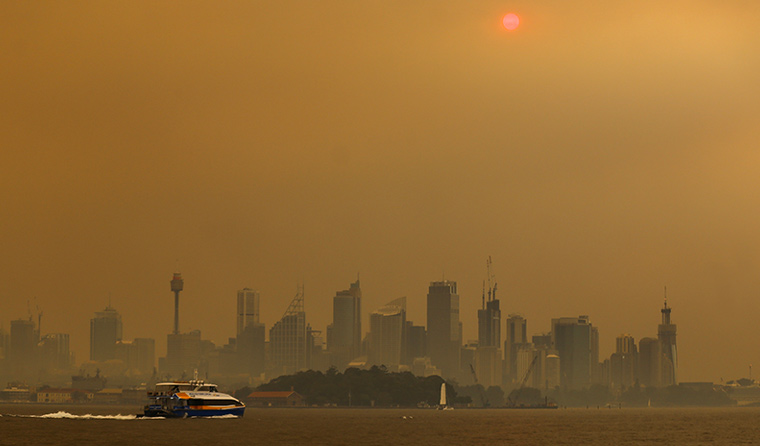News
Millions to swelter as doctors warn of ‘public health emergency’
Heat records are predicted to tumble across Australia, including in NSW, where medical groups have called for a response to ongoing air pollution from bushfire smoke.
 Australia is on track to break the record for its hottest day on record, prompting a series of heat-related health warnings. (Image: AAP)
Australia is on track to break the record for its hottest day on record, prompting a series of heat-related health warnings. (Image: AAP)
The Bureau of Meteorology is forecasting a torrid week, with temperatures in the high 30s or low 40s expected for most major cities, a situation that could see Australia break the record for its hottest day on record.
The heatwave started in Perth, which endured three consecutive days above 40⁰C – the first time this has happened in December since records began – before a ‘cool change’ saw the mercury only reach 37⁰C.
Adelaide will be next, with four days of temperatures in excess of 40⁰C forecast in coming days, while Brisbane, Melbourne and Sydney will all experience days approaching, or topping, 40⁰C this week.
Dr Jessica Kneebone, Chair of the RACGP Specific Interests Environmental Impacts in General Practice network, told newsGP the full health impacts of heatwaves can sometimes be difficult to measure. She did point out, however, that more people died from heat-related events during Melbourne’s 2009 extreme weather event than were the associated Black Saturday bushfires.
‘Heat stroke and exhaustion are some of the most directly heat-related illnesses, but heat stress can also cause or exacerbate cardiovascular and kidney problems,’ she said.
‘I would stress that heat-related illness is expected to rise as our climate continues to warm – hot days are expected to become more common, and severe and heatwaves will become the norm. Heatwave events may well become an average summer day.’
Queensland, New South Wales and Western Australia have already released public health warnings or heat plans, and Dr Kneebone believes it is important to be aware of patients most likely to be affected.
‘Children and older adults are more at risk, as are people with some chronic medical conditions and those taking certain medications, like water pills and anti-psychotic medications,’ she said.
‘The heat is also particularly hard on people who work outside or spend most of their time outdoors … [while] living in urban areas can also increase one’s chances of heat exposure because of the urban heat island effect.
‘Paved surfaces and the built environment retain heat and, according to the [Environmental Protection Agency], can make air temperatures in cities as much as five degrees warmer than nearby rural areas.’
Dr Kneebone also warned that GPs need to be aware that rising temperatures are linked to a decline in mental health.
‘Hospital admissions for mental and behavioural disorders in both rural and urban areas rise once ambient temperatures go above about 27°C,’ she said. ‘In metropolitan South Australia, admissions for mental, behavioural and cognitive disorders have been found to increase by around 7% during heatwaves.
‘Mental suffering from extreme heat [can include] more aggressive and antisocial behaviour; a higher risk of suicide, especially amongst men; and impaired concentration, mood and mental wellbeing.’

The smoke haze blanketing Sydney has gotten so bad that it has produced air pollution of up to 11 times higher than the base ‘hazardous’ level in parts of the city. (Image: AAP)
The prolonged hot weather is also likely to make life difficult for firefighters tackling out-of-control bushfires in New South Wales and Western Australia, where homes have been lost and hundreds of thousands of hectares burned.
The smoke haze blanketing Sydney has gotten so bad that it has produced air pollution of up to 11 times higher than the base ‘hazardous’ level in parts of the city, prompting a group of more than 20 medical bodies and associations to declare a ‘public health emergency’ in the state.
The joint statement calls on Prime Minister Scott Morrison and State Premier Gladys Berejiklian to ‘show leadership’ and implement measures to help alleviate ‘the health and climate crisis’.
‘Governments have a responsibility to protect the people they represent,’ the release states.
‘Climate change is worsening many extreme weather events such as serious bushfire weather, which is having devastating impacts on human health … our governments must act quickly to rapidly and deeply reduce greenhouse gas emissions, which we know are driving climate change.
‘This must include a multi-portfolio response involving federal and state governments and the development of a National Strategy on Climate, Health and Wellbeing.
‘This will ensure a nationally coordinated approach to tackling the worsening health impacts of climate change, and that health service planning includes climate change preparedness to respond to the increasing demand for health services from extreme weather events, such as bushfires and heatwaves.’
Log in below to join the conversation.
extreme weather heatwave smoke inhalation
newsGP weekly poll
As a GP, do you use any resources or visit a healthcare professional to support your own mental health and wellbeing?